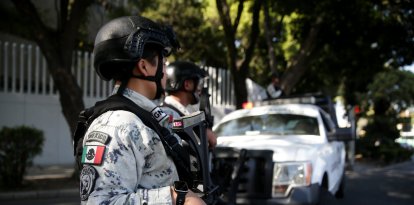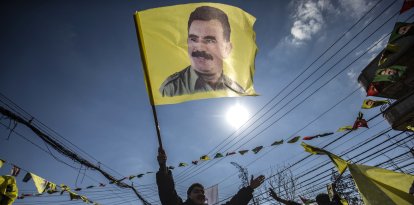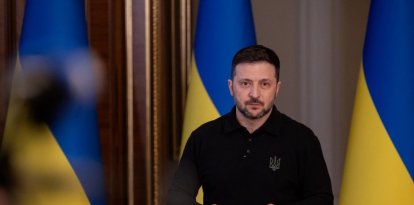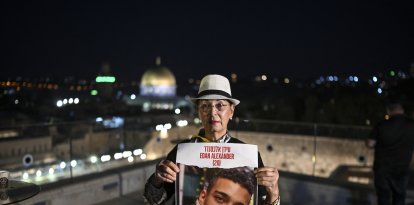ANALYSIS.
Who is Douglas Murray and why is everyone talking about him?
His new book, "On Democracies and Death Cults: Israel and the Future of Civilization," has stirred significant controversy both online and offline—so much so that it's been banned from major bookstores across Europe.

Douglas Murray at a colloquium against anti-Semitism.
On April 8, Douglas Murray published his new book, "On Democracies and Death Cults: Israel and the Future of Civilization." Since then, the influential author, commentator, and Spectator columnist has appeared on prominent podcasts and television programs, drawing widespread attention both within and beyond the digital polis of social media.
Murray's book centers on the massacre carried out by Hamas on the morning of October 7, 2023, when approximately 4,000 terrorists invaded southern Israel, killing around 1,189 people and kidnapping 251. Many of the kidnapped were taken to Gaza, and a year and a half later, they remain in captivity.
During the heinous attack, many of the victims were dancing at the Tribe of Nova electronic music festival, where 364 people were killed and 40 were taken hostage. The images captured by festival-goers will remain etched in our collective consciousness forever.
For his book, Murray traveled to Israel, spending time with survivors and the families of victims. He sought to understand "why this is a conflict in which, when the victims are attacked, they are attacked again," referring to the senseless pro-Hamas protests that erupted across the West, turning the victims of October 7 into the victimizers.
The genealogy of "On Democracies and Death Cults"
Last week, in a conversation with The Spectator, Douglas Murray talked about how he was stunned to discover that, just a day after the terrorist attack, while many of us were still processing the tragedy in Israel, a pro-Hamas demonstration was held in Times Square celebrating the massacre—even though it was still ongoing.
The author recalled quickly realizing that what he witnessed in Times Square would be repeated in numerous cities across Europe and North America.
Murray explained that after the bombing, he felt compelled to go to Israel as soon as possible because he knew immediately that "the cause of the massacre would be forgotten," and that the media would focus negatively on Israel's response to Hamas.
Douglas Murray was right in his assumption: the media did misrepresent the truth, and anti-Israel protests spread throughout the West.
British media and coverage of the massacre in Israel.
A year after the attack in Israel, Douglas Murray wrote an article for The Spectator, in which he highlighted the UK media's complacency with Hamas terrorists.
For the author, any average viewer who followed the events in the mainstream media during the year after the massacre would likely believe the following took place: "Israel attacked Hamas, Israel invaded Lebanon, Israel bombed Yemen. Oh, and someone left a bomb in a room in Tehran that killed the peaceful Palestinian leader Ismail Haniyeh."
Of course, Murray argues, all of this is a complete inversion of the truth: "Hamas invaded Israel, so Israel attacked Hamas. Hezbollah has spent the last year launching thousands of rockets into Israel, so Israel responded by destroying Hezbollah. The Houthis in Yemen—now so beloved by protesters in the UK—sent missiles and drones hundreds of miles to attack Israel, so Israel bombed Houthi weapons depots in Yemen. And the Hamas leader, Haniyeh, who was born under Egyptian rule and died in Tehran, never brought the Palestinian people anything but misery."
Anti-Israel protests in the West
The pattern of anti-Israel protests effectively replicated itself throughout the West. This was especially true in Germany and France—countries with the largest Jewish and Muslim populations in Europe—where authorities attempted to intervene in time to stop demonstrations filled with anti-Semitic hate messages. A similar situation occurred in the United Kingdom on October 9, when, less than 48 hours after the massacre, pro-Palestinian demonstrators gathered outside the Israeli embassy, shouting anti-Semitic slogans like "Israel is a terrorist state" and "Free Palestine," while lighting flares and setting off fireworks.
In the United States, universities also celebrated the attack, and many continue to do so even today.
Among these universities is Harvard, which President Trump described on Thursday as a "far-left anti-Semitic institution."
In Canada, there was also acts of anti-Semitic hatred: many synagogues were torched, and Jewish-owned schools and stores were shot up and lit on fire.
For Murray it is worth noting that during those months, not a single protest against Hamas took place in any city in the West, highlighting the loss of moral clarity in our civilized world.
The author believes that in the West, we have reached a point where we "despise ourselves" and refuse to understand an ideology that "openly calls for our own destruction."
Moral clarity is also needed in the case of Ukraine
For Murray, the lack of moral clarity applies not only to the Israel-Palestine conflict but also to the Russian invasion of Ukraine.
In his article for The Spectator, "The MAGA movement is wrong on Ukraine," Murray asks, "How can the right—especially the American right—be so wrong, or at least portions of it, when it comes to Ukraine?"
For the author, there is an entire online generation of MAGA Republicans who no longer support the conservative principle that "tanks—especially Russian tanks—should not move with impunity within an allied country."
According to Murray, this may be a consequence of the West turning its back on traditional values, particularly the Christian faith, during the Biden administration. As a result, there has been a certain admiration for Putin, who claims to defend these principles.
Initially, Republicans supported Ukraine, but as Murray points out, they "eventually got bored with the universal admiration for this country" that had been invaded, and especially "got bored with Zelensky." According to Murray, they noticed how "lost souls who had put BLM flags on their Twitter profiles were now putting Ukrainian flags."

Donald Trump and Volodimir Zelenski, listen to Vice President JD Vance.
The author explains how, after this, the online right began to absorb Russian propaganda against Ukraine: "Ukraine is not a country, Ukrainians are not real people, they are corrupt, Ukrainian soldiers are Nazis, Zelensky buys property and yachts in the south of France, the war in Ukraine is a money-laundering operation, and the war represents a waste of taxpayer money."
However, for Murray, one need only look at what is happening in Putin’s Russia in terms of corruption and his "cynical Christian faith," all while bombing cathedrals like those in Odessa and recruiting jihadists to fight for him.
On the subject of elections, the author states, "If you disagree with Zelensky's failure to hold presidential elections during wartime, one need only look at Putin's electoral habits."
For Murray, it’s time for the online right to move beyond memes, "or maybe they’ll find out the hard way that most Americans don’t like what they consider 'woke,' but they don’t like dictators either—and that it’s possible to hold both aversions in the same head, at the same time."
Douglas Murray is censured in Berlin
On "Democracies and Death Cults: Israel and the Future of Civilization" has been banned in Berlin.
Despite being praised by The Jewish Chronicle, the book cannot be found in the major bookstores in the German capital.
Arthur Roffey, a columnist for The Spectator, who lives in Berlin, was dismayed to discover that the book was not available at the reputable Dussmann bookstore on Friedrichstraße.
When the journalist inquired about the book at this famous store, which spans nearly 76,000 square feet, the saleswoman told him they didn’t carry books by Douglas Murray because he is "considered a right-wing extremist author." She further explained that they didn’t sell books on "things they don’t agree with."

On Democracies and Death Cults: Israel and the Future of Civilization.
Roffey explains that in a country where books were once burned, they have now discovered a more refined method: they simply don't sell them. It’s worth noting that Murray is the author of bestselling books such as "The Strange Death of Europe," "The Enraged Mass," and "The War Against the West."
After visiting several major bookstores and being unable to find the book, the author points out that in a city where shelves are crowded with publications on "Gender and Identity," Murray's book remains unavailable.
For Roffey, the fact that Murray's book cannot be bought "in the capital of a country that once swore it would never again erase the voices of Jewish suffering" is more than hypocrisy. "It’s a silent return to selective memory. And we've all seen how that ends."
RECOMMENDATION






















